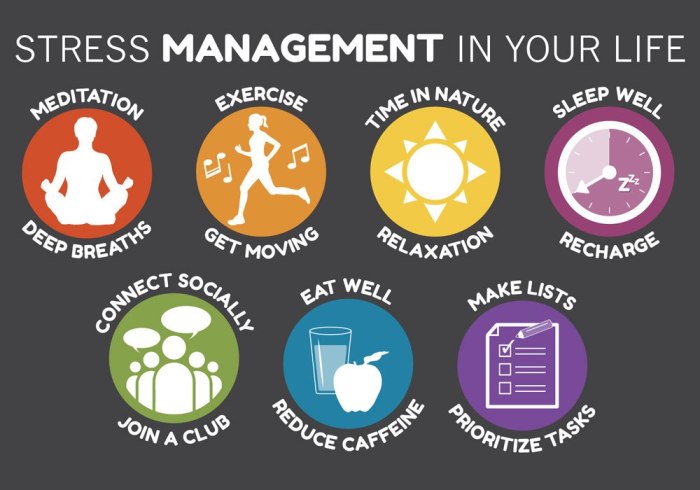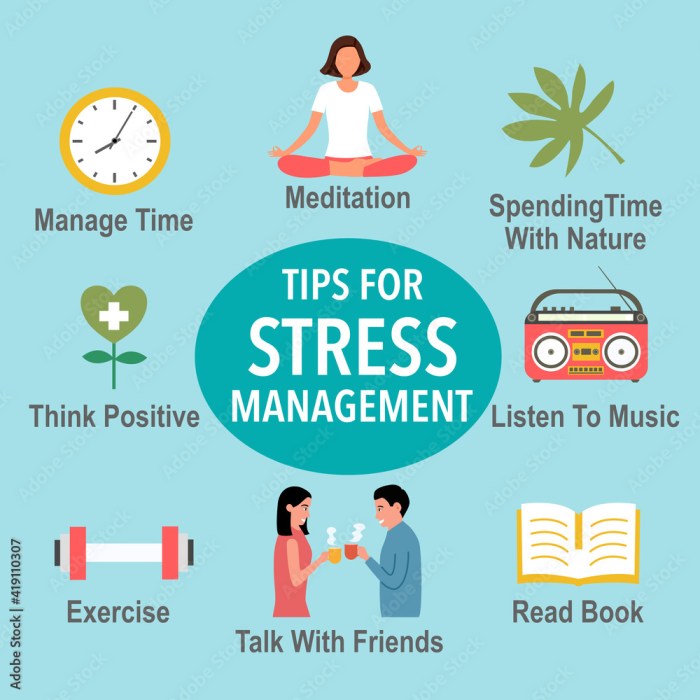Stress Management Tips: Ready to kick stress to the curb and take control of your life? Dive into effective strategies that will help you conquer stress and boost your well-being.
From healthy lifestyle choices to relaxation techniques and time management strategies, this guide has got you covered. Say goodbye to stress and hello to a happier, healthier you!
Introduction to Stress Management Tips
Stress is a common feeling that can affect both our mental and physical health. It can stem from various sources such as work, relationships, or even personal expectations. Learning how to effectively manage stress is crucial for our overall well-being.
Impact of Stress on Mental and Physical Health
- Chronic stress can lead to anxiety, depression, and other mental health issues.
- Physically, stress can contribute to high blood pressure, heart disease, and weakened immune system.
- It’s important to recognize the signs of stress and take proactive steps to address it.
Importance of Effective Stress Management Techniques
- Implementing stress management techniques can improve focus, productivity, and overall quality of life.
- By reducing stress levels, individuals can experience better sleep, improved relationships, and enhanced emotional well-being.
- Having a toolbox of stress management strategies can help individuals navigate challenging situations with resilience.
Examples of Situations that Can Lead to Stress
- Work deadlines and pressure to perform
- Conflict in relationships with family, friends, or colleagues
- Financial challenges and uncertainty about the future
Healthy Lifestyle Choices
Regular exercise plays a crucial role in stress management by helping to reduce the levels of cortisol, the stress hormone, in the body. Exercise also promotes the release of endorphins, which are known as the body’s natural mood lifters, leading to a decrease in stress and anxiety.
Exercise Benefits for Stress Reduction
- Engaging in physical activity for at least 30 minutes a day can significantly lower stress levels.
- Activities like yoga, running, or dancing can help relax the mind and body, reducing tension and promoting better sleep.
- Regular exercise boosts self-confidence and improves overall well-being, leading to better stress management.
Importance of Balanced Diet, Stress Management Tips
- A balanced diet rich in fruits, vegetables, whole grains, and lean proteins provides essential nutrients that support the body in coping with stress.
- Avoiding excessive caffeine, sugar, and processed foods can help stabilize mood and energy levels, reducing the impact of stress on the body.
- Hydrating adequately with water throughout the day can also aid in stress reduction by supporting overall health and well-being.
Adequate Sleep for Stress Reduction
- Getting 7-9 hours of quality sleep each night is crucial for proper stress management as it allows the body and mind to rest and recover.
- Establishing a bedtime routine, such as reading or meditating before sleep, can help relax the mind and prepare it for rest.
- Avoiding screens and stimulating activities before bedtime can improve sleep quality and reduce stress levels the next day.
Relaxation Techniques

When it comes to managing stress, relaxation techniques play a crucial role in helping individuals find calm and peace amidst chaos. By incorporating these practices into your daily routine, you can effectively reduce stress levels and improve overall well-being.
Benefits of Meditation for Stress Relief
Meditation is a powerful tool for stress relief as it helps calm the mind, reduce anxiety, and promote emotional well-being. By practicing meditation regularly, individuals can enhance their ability to focus, increase self-awareness, and cultivate a sense of inner peace. Through deep breathing and mindfulness, meditation allows individuals to let go of negative thoughts and emotions, leading to a more balanced and centered state of mind.
Role of Deep Breathing Exercises in Managing Stress
Deep breathing exercises are another effective way to manage stress and promote relaxation. By focusing on your breath and taking deep, slow inhales and exhales, you can activate the body’s relaxation response and reduce the production of stress hormones. Deep breathing helps lower blood pressure, reduce muscle tension, and improve oxygen flow to the brain, leading to a calmer and more focused state of mind.
Incorporating Mindfulness Practices into Daily Routines
Mindfulness practices involve being fully present in the moment and paying attention to your thoughts, feelings, and surroundings without judgment. By incorporating mindfulness into your daily routines, such as mindful eating, walking, or even driving, you can increase awareness, reduce stress, and improve overall mental clarity. Mindfulness allows individuals to cultivate a greater sense of gratitude, compassion, and acceptance, leading to a more positive outlook on life.
Time Management Strategies

Effective time management is crucial for reducing stress levels and increasing productivity. By prioritizing tasks, setting realistic goals, and organizing spaces, individuals can better manage their time and alleviate stress.
Importance of Prioritizing Tasks
- Make a to-do list and prioritize tasks based on deadlines and importance.
- Focus on completing high-priority tasks first to avoid feeling overwhelmed.
- Break down large tasks into smaller, more manageable steps to increase efficiency.
Setting Realistic Goals
- Set specific, achievable goals to prevent feelings of failure or inadequacy.
- Break goals into short-term and long-term objectives to track progress effectively.
- Adjust goals as needed to accommodate changes in priorities or circumstances.
Organizing and Decluttering Spaces
- Keep work and living spaces organized to reduce distractions and improve focus.
- Declutter regularly to create a sense of calm and order in your environment.
- Assign specific spaces for different activities to enhance productivity and efficiency.
